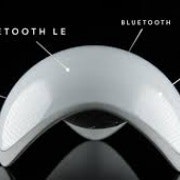REVIEW: The Ninja Sphere
The Ninja Sphere works with different home automation systems. Source: The Australian
“Look into the crystal ball and you'll see the future”, the crafty-looking psychic said.
And I'm saying it, too, after playing with a crystal ball that's definitely futuristic.
Unlike the ones inside tents at church fairs, the Ninja Sphere is a computer in disguise with an Arm Cortex-A8 processor.
It's Australian developed, it runs Ubuntu Linux, and it's about to control homes worldwide — and in a nice way.
Last week, it controlled my home in what was the first time a Ninja Sphere had been trialled in a domestic setting, outside a lab.
We first looked at Redfern-based start-up Ninja Blocks about 20 months ago, when it produced its army of little Ninjas known as Ninja Blocks, a $200 kit initially made by hand. Components were soldered on to baseboards and baked in a family oven. The Ninja Blocks were internet-connected and controlled a bunch of supplied RF sensors such as for temperature and window locks.
You could program your Ninja to tell you if someone was breaking in through the window, for example. I enjoyed programming my Ninja to send me an SMS whenever someone pressed what was a $6 radio connected doorbell in the kit. But the programming was a bit geeky, and beyond what Joe Public would bother with.
This second project — the Ninja Sphere — is very different. It's an elegant-looking Sphere you can place with pride on your loungeroom table.
Tap it and the lights in your room turn on; tap again and they turn off. Swipe your hand over the top to move to another device in your room, and tap it to turn it on or off.
Of course, you need special kinds of lights and power points, but Ninja Sphere works with those widely available here. That makes it appealing to a wider audience.
We connected a Sphere to a set of Philips Hue lights, a lamp controlled by a Belkin WeMo switch and a Sonos music system — all available in Australia.
Soon, the Sphere will connect to Google's Chromecast dongle, so you'll be able to play, pause and control your television's volume.
Ninja Blocks also is targeting Parrot's Flower Power plant sensor. You'll tap the Sphere to download garden plant data. Netflix and YouTube are on the road map, too.
Setting up wasn't too complex. You plug in the Sphere, download the Ninja Sphere app (for iOS and Android) and then pair them by typing a four-digit code that shines on top of the Sphere.
The system then seeks to find all your home Wi-Fi-connected devices. You then organise your devices into rooms using the app.
The Sphere becomes capable of controlling these devices once it is connected to your home network. You can also control devices using the nicely crafted app, which is driven by the Sphere.
The fact that the app connects to lights and switches made by different firms such as Philips and Belkin is impressive. The Sphere is indeed shaping as a one-stop control device.
So how did this go? Swiping and tapping worked, although it needs some fine tuning, which Ninja Blocks says it is doing right now.
Sometimes, the Sphere would not register my swipe or a tap, but more than 90 per cent of the time it did. Sometimes, this was my fault, having not mastered the gestures.
I also could change the colour of Philips' Hue colour light strips by holding my hand above the Sphere. I could tap the Sphere and turn on and off a Sonos sound system volume.
Twiddling a finger over the Sphere to adjust the volume level worked only intermittently, but the team promises “rock solid” performance ahead of the first Spheres reaching their owners.
Overall, the idea of using a Sphere and gestures to control home electronics looks fantastic.
Ninja Blocks chief executive Daniel Friedman said a launch for Sphere backers would take place on December 18 and some will get Spheres at this event.
Those ordered through kickstarter.com will reach owners from December 21. Some 2500 Spheres will be shipped globally over six weeks. Manufacture is taking place in Taiwan
As a start-up project, Ninja Sphere has been an outstanding success, attracting $702,937 on Kickstarter.com, six times the $115.000 sought. In addition, Ninja Blocks raked in another $US700,000, from venture capital firms including Blackbird Ventures and SingTel Innov8.
With Spheres being rolled out, Ninja Blocks is promising not only tweaks to improve performance, but an ongoing road map of new functionality through Sphere updates.
Later, you'll set schedules to have the Sphere turn on certain lights when it gets dark or receive notifications if you leave the lights on.
The Sphere will know when you leave home or arrive back and adjust accordingly. Google promises some of this functionality with its upcoming Nest system, but instead it's being rolled out right now by an Australian start-up with 10-12 staff.
I'll revisit Ninja Sphere once the system is tweaked and the rollout is fully under way.
Rating: 8.5/10
Price: $329
This story was first published in The Australian

















